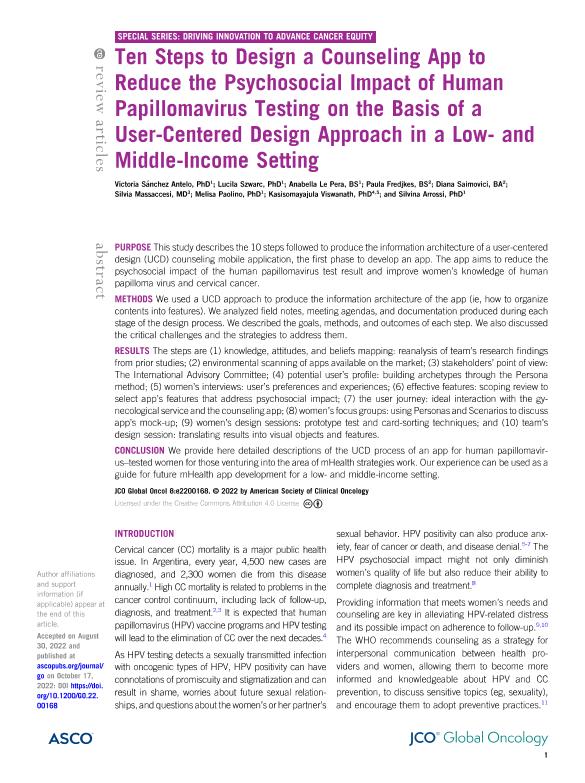Artículo
Ten Steps to Design a Counseling App to Reduce the Psychosocial Impact of Human Papillomavirus Testing on the Basis of a User-Centered Design Approach in a Low- and Middle-Income Setting
Sánchez Antelo, Victoria Inés María ; Szwarc, Lucila
; Szwarc, Lucila ; Le Pera, Anabella Hebe
; Le Pera, Anabella Hebe ; Fredjkes, Paula; Saimovici, Diana; Massaccesi, Silvia; Paolino, Melisa Delia
; Fredjkes, Paula; Saimovici, Diana; Massaccesi, Silvia; Paolino, Melisa Delia ; Viswanath, Kasisomayajula; Arrossi, Silvina
; Viswanath, Kasisomayajula; Arrossi, Silvina
 ; Szwarc, Lucila
; Szwarc, Lucila ; Le Pera, Anabella Hebe
; Le Pera, Anabella Hebe ; Fredjkes, Paula; Saimovici, Diana; Massaccesi, Silvia; Paolino, Melisa Delia
; Fredjkes, Paula; Saimovici, Diana; Massaccesi, Silvia; Paolino, Melisa Delia ; Viswanath, Kasisomayajula; Arrossi, Silvina
; Viswanath, Kasisomayajula; Arrossi, Silvina
Fecha de publicación:
10/2022
Editorial:
American Society of Clinical Oncology
Revista:
JCO global oncology
e-ISSN:
2687-8941
Idioma:
Inglés
Tipo de recurso:
Artículo publicado
Clasificación temática:
Resumen
PURPOSE: This study describes the 10 steps followed to produce the information architecture of a user-centered design (UCD) counseling mobile application, the first phase to develop an app. The app aims to reduce the psychosocial impact of the human papillomavirus test result and improve women's knowledge of human papilloma virus and cervical cancer. METHODS: We used a UCD approach to produce the information architecture of the app (ie, how to organize contents into features). We analyzed field notes, meeting agendas, and documentation produced during each stage of the design process. We described the goals, methods, and outcomes of each step. We also discussed the critical challenges and the strategies to address them. RESULTS: The steps are (1) knowledge, attitudes, and beliefs mapping: reanalysis of team's research findings from prior studies; (2) environmental scanning of apps available on the market; (3) stakeholders' point of view: The International Advisory Committee; (4) potential user's profile: building archetypes through the Persona method; (5) women's interviews: user's preferences and experiences; (6) effective features: scoping review to select app's features that address psychosocial impact; (7) the user journey: ideal interaction with the gynecological service and the counseling app; (8) women's focus groups: using Personas and Scenarios to discuss app's mock-up; (9) women's design sessions: prototype test and card-sorting techniques; and (10) team's design session: translating results into visual objects and features. CONCLUSION: We provide here detailed descriptions of the UCD process of an app for human papillomavirus-tested women for those venturing into the area of mHealth strategies work. Our experience can be used as a guide for future mHealth app development for a low- and middle-income setting.
Archivos asociados
Licencia
Identificadores
Colecciones
Articulos(SEDE CENTRAL)
Articulos de SEDE CENTRAL
Articulos de SEDE CENTRAL
Citación
Sánchez Antelo, Victoria Inés María; Szwarc, Lucila; Le Pera, Anabella Hebe; Fredjkes, Paula; Saimovici, Diana; et al.; Ten Steps to Design a Counseling App to Reduce the Psychosocial Impact of Human Papillomavirus Testing on the Basis of a User-Centered Design Approach in a Low- and Middle-Income Setting; American Society of Clinical Oncology; JCO global oncology; 8; e2200168; 10-2022; 1-14
Compartir
Altmétricas



